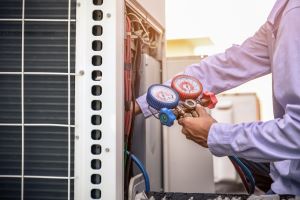High-Performance Systems Installed by DMAKS HVAC Specialists.
High-Performance Systems Installed by DMAKS HVAC Specialists.
Blog Article
Energy-Efficient Heating And Cooling Systems to Save on Utility Expenses
As power prices proceed to rise, the importance of energy-efficient Cooling and heating systems becomes significantly obvious. These systems not just promise considerable cost savings on utility expenses yet also add to a much more sustainable future by decreasing energy consumption.
Benefits of Energy-Efficient A/c Solutions
Energy-efficient heating and cooling systems supply many benefits that prolong beyond simple price financial savings. One considerable benefit is the decreased environmental impact. By consuming less power, these systems contribute to lower greenhouse gas exhausts, helping to battle climate modification and advertise sustainability. This lines up with enhancing social needs for eco-friendly methods in household and industrial settings.
Furthermore, energy-efficient HVAC systems commonly offer enhanced comfort levels. A lot of these systems include innovative modern technology that permits for better temperature level control and boosted air quality (DMAKS HVAC). This causes a healthier indoor setting, which is especially vital for individuals with allergic reactions or breathing concerns
Furthermore, buying energy-efficient heating and cooling systems can improve property worth. As more customers focus on power effectiveness, homes and buildings furnished with these systems might bring in greater proposals in the property market.
Kinds Of Energy-Efficient Heating And Cooling Options
Exactly how can home owners and businesses pick one of the most appropriate energy-efficient HVAC options for their demands? The marketplace provides a variety of energy-efficient HVAC systems, each developed to enhance convenience while lessening energy consumption.
One option is the variable cooling agent flow (VRF) system, which efficiently regulates the temperature in numerous zones within a structure. This system adapts its cooling agent flow to match the preferred temperature, bring about considerable energy cost savings.
One more preferred option is geothermal heat pumps, which use the earth's secure temperature to warm and amazing rooms. By transferring warm to and from the ground, these systems show excellent efficiency, especially in modest climates.
In addition, ductless mini-split systems provide an energy-efficient option for homes lacking ductwork. These systems permit zone-specific heating & cooling, lowering energy waste in vacant locations.
Lastly, high-efficiency heating systems and a/c, with sophisticated SEER and AFUE rankings, use reputable climate control while taking in much less energy than conventional versions. By assessing these choices, homeowners and companies can select a cooling and heating system tailored to their details demands and power efficiency goals.
Secret Attributes to Consider

Following, investigate the kind of compressor utilized in the system. DMAKS HVAC. Variable-speed compressors can adjust their outcome to match the home heating or cooling down demand, bring about enhanced convenience and power cost savings contrasted to single-speed designs. In addition, search for systems outfitted with wise thermostats that offer programmable settings and remote accessibility, permitting far better control over energy consumption
Another vital function is the system's air purification capability. High-efficiency filters can boost indoor air top quality and decrease energy consumption by making sure the system operates effectively. In addition, take into consideration the kind of cooling agent utilized; contemporary systems commonly use eco-friendly cooling agents that have a reduced ecological influence.
Finally, make sure that the system works with zoning technology, which enables tailored temperature control in various areas of your home, enhancing convenience while reducing energy use.
Tips for Picking the Right System


Next, think about energy efficiency ratings, particularly the Seasonal Power Performance Ratio (SEER) for cooling systems and the Yearly Gas Application Performance (AFUE) for heater. Higher rankings suggest greater efficiency, which can bring about considerable cost savings on energy bills in time.
In addition, examine the sort of heating and cooling system that best fits your way of living and spending plan. Alternatives consist of central air, ductless mini-splits, and heatpump, each with its very own set of benefits and disadvantages.
Do not ignore the value of proper installment and sizing; an improperly sized system can lead to inadequacies and increased wear. Seek advice from with a specialist Cooling and heating specialist to get professional referrals tailored to your home's unique demands. This extensive strategy will make sure that you select an energy-efficient HVAC system that meets your requirements and spending plan efficiently.
Maintenance for Optimum Effectiveness
As soon as the right heating and cooling system remains in area, recurring maintenance ends up being crucial to ensuring optimal effectiveness and longevity. A properly maintained system runs better, leading to visit the site reduced power intake and reduced utility bills. Regular evaluations and tune-ups ought to be set up at the very least twice a year-- when before the cooling period and once before the home heating period.

Homeowners must also be vigilant concerning monitoring their HVAC system's performance. Uncommon noises, rising and fall temperature levels, or increased energy costs can indicate underlying problems that call for prompt interest. By addressing these worries immediately, house owners can prevent costly repair work and prolong the life expectancy of their systems.
Purchasing a maintenance strategy with a certified specialist not only improves efficiency however also supplies comfort, recognizing visit the site that the system is running at its finest. DMAKS HVAC. Regular upkeep is for that reason crucial for sustaining power efficiency and minimizing total functional prices
Conclusion
Finally, energy-efficient HVAC systems offer a viable solution for decreasing utility bills while improving convenience and air top quality. By including innovative modern technologies and options such as geothermal heatpump and ductless mini-splits, homeowner can achieve significant energy cost savings and contribute to ecological sustainability. Cautious consideration of system attributes and recurring upkeep further ensures optimal efficiency, making energy-efficient systems a sensible financial investment for both financial and environmental benefits.
Report this page